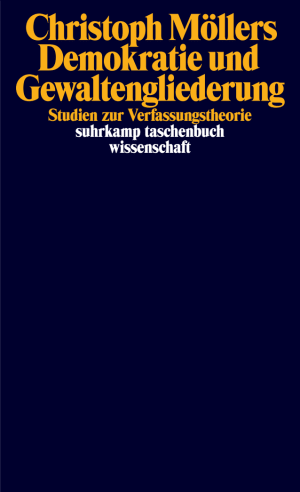Nominated for the Leipzig Book Fair Prize 2021
Nominated for the Deutscher Sachbuchpreis 2021
»Is reason or is idiosyncrasy the mother of freedom?«
We are familiar with degrees of freedom in the field of mechanics. The term denotes the number of directions into which a rigid body connected to a joint can move. In attempt at modernising liberalism, Christoph Möllers starts neither with the general political climate nor the conflict between the individual and society.
Instead, he tries to dissect the characteristics of an order that allows for mobility and social variability. Equipped this way he doesn’t promise any answers...
We are familiar with degrees of freedom in the field of mechanics. The term denotes the number of directions into which a rigid body connected to a joint can move. In attempt at modernising liberalism, Christoph Möllers starts neither with the general political climate nor the conflict between the individual and society.
Instead, he tries to dissect the characteristics of an order that allows for mobility and social variability. Equipped this way he doesn’t promise any answers but new perspectives on various phenomena: on the term of political representation but also on the role of territorial borders. Freedom, according to Möllers, is the practice of open-endedness that facilitates processes of which it must be unclear where they lead.
»This book is a perfect yoga session for political thinking. Rusty ideas are loosened and attention is refocused onto connections you didn’t even know were important.« Charlotte Klonk, ZEIT Wissen
»[...] an eminently political book that not only deals with liberal thought and action but also with the problems of politics overall.« Herfried Münkler, Frankfurter Allgemeine Zeitung
»In the end, the readers feels overwhelmed by virtuosity and creativity ...« Jens Jacke, DIE ZEIT
»Degrees of Freedom is one of the best books of the recent past, rich in observations, ideas, apt and often aphoristic formulations.« Jens Bisky, Süddeutsche Zeitung
»full of clever ideas about the traditional antagonism between the individual and the community« DIE WELT
»This book is a perfect yoga session for political thinking. Rusty ideas are loosened and attention is refocused onto connections you didn’t even know were important.« Charlotte Klonk, ZEIT Wissen
»[...] an eminently political book that not only deals with liberal thought and action but also with the problems of politics overall.« Herfried Münkler, Frankfurter Allgemeine Zeitung
»In the end, the readers feels...
Persons
Christoph Möllers
Christoph Möllers, born in 1969, teaches Public Law and Legal Philosophy at the Humboldt-University of Berlin. In 2015, he was awarded the Leibniz Prize, the most important research award in Germany.
Christoph Möllers, born in 1969, teaches Public Law and Legal Philosophy at the Humboldt-University of Berlin. In 2015, he was awarded the...
OTHER PUBLICATIONS

Public Artistic Freedom

Democracy and the Division of Powers

The Possibility of Norms
English world rights (Oxford UP)
